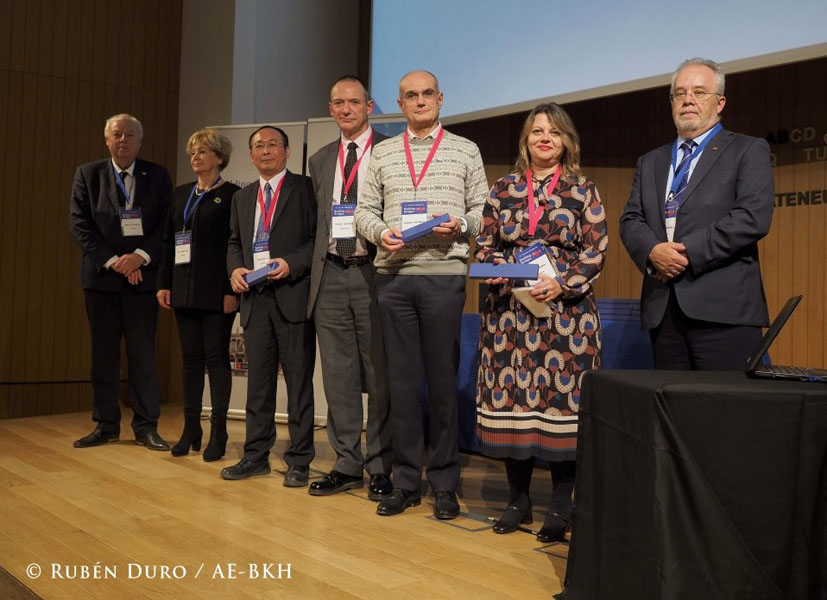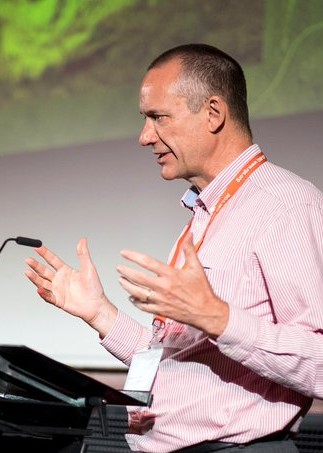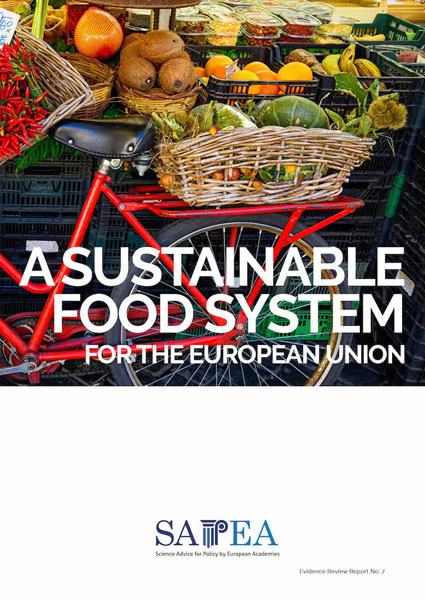Examining the sustainability of our food systems: Interview with Peter Jackson MAE#
Professor Peter Jackson MAE explains why he became involved in the study of food, and his role in the publication of a major evidence review on sustainable food systems.
About Peter Jackson#
Peter Jackson is Professor of Human Geography at the
University of Sheffield
. He is the Co-Director of the University’s
Institute for Sustainable Food
. His research focuses on commodity culture and the geography of consumption with a particular interest in food.
Professor Jackson is a member of DEFRA ‘s Social Science Expert Group (Department for Environment, Food and Rural Affairs) and previously chaired the Food Standards Agency
‘s Social Science Expert Group (Department for Environment, Food and Rural Affairs) and previously chaired the Food Standards Agency ’s Social Science Research Committee. He was elected as a Fellow of the British Academy
’s Social Science Research Committee. He was elected as a Fellow of the British Academy in 2017 and the Academia Europaea in 2019.
in 2017 and the Academia Europaea in 2019.
Food as a research interest#
Peter, what drew you to ‘food’ as your major research interest?
“Food is one of the most direct ways in which human beings connect with the natural world even in an increasingly urbanised environment where many people are relatively disconnected from the places where food is grown. It’s therefore a compelling research area for people like me who were trained in geography and anthropology, at the intersection between the social and environmental sciences. As well as being a necessity for human life, food is deeply embedded in our social and cultural imagination, part of our everyday lives in families and communities. More broadly, too, food is a pressing issue for our planetary survival, closely connected with climate change, biodiversity loss and the other ‘grand challenges’ facing the world today.”
The issues with contemporary food systems#
Why is food such a big global challenge?
“Contemporary food systems are a major contributor to greenhouse gas emissions, the depletion of our soils and the deterioration of water quality. They are also responsible for major social inequalities, with many parts of the world suffering from chronic hunger and malnutrition while other places are experiencing increasing rates of obesity and an associated rise in non-communicable diseases. Even in relatively affluent parts of the world, the number of people using foodbanks and other forms of emergency food aid has risen alarmingly and the Coronavirus pandemic has demonstrated the fragility of modern food supply chains. To face this challenge requires more joined-up thinking, acknowledging that piecemeal approaches will be ineffective. It also requires an understanding of the shared responsibility for change, involving government, business and civil society all playing their part.”
Addressing these problems#
What potential solutions are presenting themselves to address these problems?
“The conventional answer to food system challenges is to focus on the potential of ‘sustainable intensification’, harnessing technological innovation to produce ‘more from less’ (using less land, fewer artificial inputs such as fertilisers and insecticides, and more efficient use of water and other resources). Others question this view, suggesting that narrowly-framed ‘agri-tech’ solutions will be of limited use without wider changes to the food system focused on redistribution and social justice. There are many other potential solutions including a concerted effort to reduce food waste at all points along the supply chain, support for agro-ecology and other alternatives to industrialised agriculture, more localised food production through the use of hydroponics and other forms of urban farming, and a shift towards more plant-based diets. These are the kind of issues we are addressing in the Institute for Sustainable Food at the University of Sheffield
at the University of Sheffield , taking an integrated, interdisciplinary approach to propose practical solutions to real-world problems.”
, taking an integrated, interdisciplinary approach to propose practical solutions to real-world problems.”
What the report ‘A Sustainable Food System for the EU’ tells us#
You have led the SAPEA Evidence Review Report Towards an EU Sustainable Food System. What did that involve, and what are the key messages of the report?
“The Evidence Review Report was written by a group of international experts, recommended by their respective national Academies. It was my pleasure to chair this working group and to coordinate the production of the report. The group met three times during 2019 – in London, Berlin and Amsterdam – to agree the shape of the report and to review successive drafts. We also had external input from an Expert Workshop and a meeting of European stakeholders (both held in Brussels). The report concludes that the current food system is unsustainable and that urgent change is needed in order to make a successful and timely transition to a more sustainable and socially just system. We provide a series of ‘best practice’ examples from around Europe, reviewing the evidence of ‘what works’ in terms of food system transition, and why a combination of ‘hard’ and ‘soft’ measures, including taxation and legislation as well as consumer campaigns and health messaging, are the most effective way of promoting change. It is heartening to see that the European Commission appears to be open to the arguments and evidence that we presented in our report, judging by its new ‘Farm to Fork Strategy for a Sustainable Food System’.”
appears to be open to the arguments and evidence that we presented in our report, judging by its new ‘Farm to Fork Strategy for a Sustainable Food System’.”
The importance of a Systematic Review#
You were also on the Advisory Group for the Systematic Review which was undertaken for the SAPEA report Towards an EU Sustainable Food System. What did this involve and what was the purpose of the Systematic Review?
“Systematic reviews are a fundamental part of the process that leads to the publication of an Evidence Review Report. They ensure that the Report is based on the most up-to-date and reliable evidence from the peer-reviewed literature, using carefully-considered search terms and systematic selection criteria. It was a pleasure to work with the Library and SURE (Specialist Unit for the Review of Evidence) team at Cardiff University
and SURE (Specialist Unit for the Review of Evidence) team at Cardiff University , with overall coordination by Louise Edwards
, with overall coordination by Louise Edwards (on behalf of Academia Europaea). We also had an excellent advisory board, led by Professor Terry Marsden
(on behalf of Academia Europaea). We also had an excellent advisory board, led by Professor Terry Marsden , which ensured that the literature search was informed by strong subject knowledge on food systems.”
, which ensured that the literature search was informed by strong subject knowledge on food systems.”
What being of member of the Academia Europaea means to me#
You were elected as a member of the Academia Europaea last year. What does this mean to you?

Peter Jackson (4th from left) at the annual conference of Academia Europaea in Barcelona 2019
“It was a great honour to be elected to the Academia Europaea last year and to attend the awards ceremony in Barcelona. Much of my research has had a comparative European dimension including an ERA-Net SUSFOOD project with colleagues in Denmark, Germany and Sweden. I also won a European Research Council
with colleagues in Denmark, Germany and Sweden. I also won a European Research Council award in the very first round of the competition and I’ve been a long-standing supporter of funding programmes that extend beyond national boundaries. The ERC grant led to a book called Anxious Appetites: food and consumer culture
award in the very first round of the competition and I’ve been a long-standing supporter of funding programmes that extend beyond national boundaries. The ERC grant led to a book called Anxious Appetites: food and consumer culture (Bloomsbury, 2015) and the ERA-Net project culminated in a co-authored book on Reframing Convenience Food
(Bloomsbury, 2015) and the ERA-Net project culminated in a co-authored book on Reframing Convenience Food (Palgrave Macmillan, 2018). I have fond memories of the academic networks that I established on these projects and the lasting friendships to which they gave rise.”
(Palgrave Macmillan, 2018). I have fond memories of the academic networks that I established on these projects and the lasting friendships to which they gave rise.”
Further information#
All reports relating to the topic A Sustainable Food System for the EU are openly available at the SAPEA website. These include the Evidence Review Report, the Systematic Review on the Policy Ecosystem, and the Scientific Opinion of the Group of Chief Scientific Advisors.
website. These include the Evidence Review Report, the Systematic Review on the Policy Ecosystem, and the Scientific Opinion of the Group of Chief Scientific Advisors.
 . He is the Co-Director of the University’s Institute for Sustainable Food
. He is the Co-Director of the University’s Institute for Sustainable Food . His research focuses on commodity culture and the geography of consumption with a particular interest in food.
. His research focuses on commodity culture and the geography of consumption with a particular interest in food.
 ‘s Social Science Expert Group (Department for Environment, Food and Rural Affairs) and previously chaired the Food Standards Agency
‘s Social Science Expert Group (Department for Environment, Food and Rural Affairs) and previously chaired the Food Standards Agency ’s Social Science Research Committee. He was elected as a Fellow of the British Academy
’s Social Science Research Committee. He was elected as a Fellow of the British Academy in 2017 and the Academia Europaea in 2019.
in 2017 and the Academia Europaea in 2019.
 at the University of Sheffield
at the University of Sheffield , taking an integrated, interdisciplinary approach to propose practical solutions to real-world problems.”
, taking an integrated, interdisciplinary approach to propose practical solutions to real-world problems.”
 appears to be open to the arguments and evidence that we presented in our report, judging by its new ‘Farm to Fork Strategy for a Sustainable Food System’.”
appears to be open to the arguments and evidence that we presented in our report, judging by its new ‘Farm to Fork Strategy for a Sustainable Food System’.”
 and SURE (Specialist Unit for the Review of Evidence) team at Cardiff University
and SURE (Specialist Unit for the Review of Evidence) team at Cardiff University , with overall coordination by Louise Edwards
, with overall coordination by Louise Edwards (on behalf of Academia Europaea). We also had an excellent advisory board, led by Professor Terry Marsden
(on behalf of Academia Europaea). We also had an excellent advisory board, led by Professor Terry Marsden , which ensured that the literature search was informed by strong subject knowledge on food systems.”
, which ensured that the literature search was informed by strong subject knowledge on food systems.”
 with colleagues in Denmark, Germany and Sweden. I also won a European Research Council
with colleagues in Denmark, Germany and Sweden. I also won a European Research Council award in the very first round of the competition and I’ve been a long-standing supporter of funding programmes that extend beyond national boundaries. The ERC grant led to a book called Anxious Appetites: food and consumer culture
award in the very first round of the competition and I’ve been a long-standing supporter of funding programmes that extend beyond national boundaries. The ERC grant led to a book called Anxious Appetites: food and consumer culture (Bloomsbury, 2015) and the ERA-Net project culminated in a co-authored book on Reframing Convenience Food
(Bloomsbury, 2015) and the ERA-Net project culminated in a co-authored book on Reframing Convenience Food (Palgrave Macmillan, 2018). I have fond memories of the academic networks that I established on these projects and the lasting friendships to which they gave rise.”
(Palgrave Macmillan, 2018). I have fond memories of the academic networks that I established on these projects and the lasting friendships to which they gave rise.”
 website. These include the Evidence Review Report, the Systematic Review on the Policy Ecosystem, and the Scientific Opinion of the Group of Chief Scientific Advisors.
website. These include the Evidence Review Report, the Systematic Review on the Policy Ecosystem, and the Scientific Opinion of the Group of Chief Scientific Advisors.




